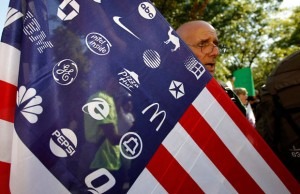After six of weeks of seemingly endless Occupy Wall Street protests taking place across the country, the movement may finally have a concrete legislative proposal it can get behind. Senator Tom Udall (D-New Mexico) has just proposed a constitutional amendment that would allow Congress to regulate campaign spending in federal elections, effectively overturning the Supreme Court's controversial Citizens United ruling. It's not quite the revolution that some occupiers have been hoping for, but there's little doubt that the proposed amendment is a response to the recent public outcry over undue corporate influence in politics.
Many Occupy Wall Street protesters have been calling for an "end to corporate personhood" since the movement began on September 17th. While the proposed amendment wouldn't really do that, it would certainly put a limit on the rights that corporations can claim as "people." So what is corporate personhood and how does it relate to campaign finance?
It's actually more than just a Mitt Romney campaign gaffe. While he's still getting knocked for saying "corporations are people," he was sort of right, legally speaking.
During the 19th century the Supreme Court ruled that corporations should be recognized as people for the purposes of the 14th amendment. Most of these cases were about taxation issues and the rulings were essentially meant to provide a legal framework for corporations to be taxed and sued as individual entities. However corporations began using their new legal status as people to contribute directly to political campaigns, which the public was not fond of. In 1907, at the behest of then president Teddy Roosevelt, Congress passed a law banning corporations from donating directly or indirectly to political campaigns.
Cut ahead 100 years to the infamous Citizen's United ruling in January of 2010. In a controversial 5-4 decision, the Supreme Court ruled that a corporation's election related "independent expenditures" could not be limited by Congress, effectively throwing out decades worth of campaign finance laws. Corporations are stilled barred from donating directly to campaigns, but they are now able to anonymously spend unlimited amounts of money on television, radio and print ads in support of, or opposition to, any political campaign.
The ruling has raised some serious issues about the influence of corporations on our political system. When you hear Occupy Wall Street protesters calling for an "end to corporate personhood," they're talking about ending the legal distinction that allows this to happen. This is why the occupiers should be happy that one of their central demands is finally being addressed, though the fact that the one of the establishment parties is doing it probably irks them at little bit (Come on guys, it had to happen eventually). The amendment wouldn't end corporate personhood but it would mean that election related "independent expenditures" by corporations would no longer be considered a protected form of speech, thus allowing Congress to regulate them.
Critics of overturning Citizen's United argue that since corporations are legally "people" they should not have their freedom of speech limited any more than individuals do. At the end of the day, these critics say, corporations are just groups of people who are entitled to the same rights as everyone else.
The problem I have with these critics is that they seem to be completely preoccupied with the "rights" that should be accorded to corporations and not the responsibilities. For example: If someone is charged with arson in Benton, Arkansas, can Wal-Mart be forced to sit on the jury?
In April of 2009 a BP oil rig exploded in the Gulf of Mexico, killing 11 people. Since BP is apparently a person, shouldn't it be charged with 11 counts of negligent homicide?
In 2010 General Electric paid absolutely no federal taxes. Since it made over $14.2 billion in profits, shouldn't it be forced to pay federal income tax like most Americans? $14.2 billion would certainly put them in the highest federal tax bracket, so about 35% of that money should be going to the federal government.
One could go on with this kind of thinking forever, but that is exactly the point. Corporations seem to want to be people when it benefits them, but they want to just be corporations when it doesn't. There's been a lot of talk about undue corporate influence in government and campaign spending is a perfect example of that. As the recent Solyndra scandal should remind everyone, politicians have a tendency to help out the people who get them elected. If candidates start relying entirely on corporations to get their message out, then how can we expect them to pass legislation that might benefit the American people at the expense of those corporations?
A constitutional amendment to overturn the Citizens United ruling is one of the first things we need to get our democracy back into the hands of the people. That doesn't seem very likely with the current Congress running the show but, then again, we are going to be seeing new episodes of Arrested Development soon so I suppose anything is possible.
